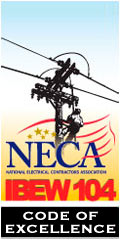
| Past Issues/Subscribe | Employment | neppa.org | Legislative Update | Advertise | February 2015 |

|
*WARNING* THIS ARTICLE IS FRAUGHT WITH PERSONAL OPINION
This month, as every February, we take stock of our industry issues as we prepare for our annual visit to Washington to address elected and appointed leaders. As I reviewed the items from previous years and this year, I noticed there is a consistency to some. As I sit back and try to review solutions, the main one keeps coming back to reformation of ISO-New England.
What issues could be resolved if there was only some oversight or accountability of ISO-New England? Here is an abbreviated list:
If you were sitting around your local coffee shop trying to come up with common sense solutions to these real problems impacting New England consumers, the solutions would be easy.
The first is the simplest: change the rules for RTOs (Regional Transmission Organizations). Do not allow them to pay or participate in lobbying. These organizations are the creations of FERC, a federal agency. They should be prohibited from spending any money on lobbying and should only be able to address elected leaders in public forums or through FERC.
I can’t tell you how many times we have heard from congressional staffers, "Oh, we heard from the ISO folks that you were going to bring this up," or "The ISO folks are coming in next week to give us their take." Isn’t this the role for FERC? If they are overseeing RTOs, then they should be defending their positions and failures.
Second, change the ISO budget and compensation structures. For every point the transmission incentives exceed the prevailing market rates for lending, let the ISO budget and executive salaries be docked by the same percentage. OK, we do want to incentivize construction, so maybe add 3 percent to the standard market rates and then apply this solution.
Anytime 75 percent of the market participants vote against a RTO proposal, the proposal should, by rule, be dead! Ninety percent of the participants voted against the Performance Incentives Proposal due to the negative impact on consumers. They could also pose an alternative, which is any time 75 percent or more of the market participants vote for something a feasibility study should be conducted to vet the solution.
If a community decides to build its own generation, let them! This has never been done to manipulate the market and in no real world model could it be done to do so. Because of the efficiency of our business model we sometimes build and provide generation at a lower cost than ISO floor prices. When this occurs, we should never be told that if we build, we cannot bid in at our price because it is too low. How is reliability enhanced when individual communities lose their ability to provide their own power and when a system becomes dependent upon external energy sources?
Set a minimum generation percentage for the region. As these sometimes senseless market rules have been promulgated, they have combined with purposefully changing EPA standards and resulted in a curve that will eventually lead to New England being heavily dependent upon imported energy. This is neither good for consumers nor business. So, maybe this is another area we can incentivize ISO-NE. FERC should set the ISO-NE budget on "only energy generated" in the region. Every time generation takes a hit so should the ISO-NE budget.
I think the concept here is that maybe the RTOs should be treated like they would be treated in a free market. When they fail, their budgets should be reduced and so should the compensation to their executives. The simplest solutions are always the best!
Finally, FERC should modify the mission of the RTOs to "providing the highest level of reliability at the fairest cost." Water, electricity and heat have reached the level of air in most people's eyes in that they should just be there. But, the new element to this discussion is what we saw with the Net Neutrality debate this past year. There was a great deal of opposition to having different pricing for different speeds of access. We recognize that electricity is an essential service, but people do not expect to pay a premium for it. The public power model recognizes this and it is time for the other industry elements to recognize this. FERC needs to recognize this, before it becomes too volatile of a component to the overall economy, like oil was in the early '70s.
|





